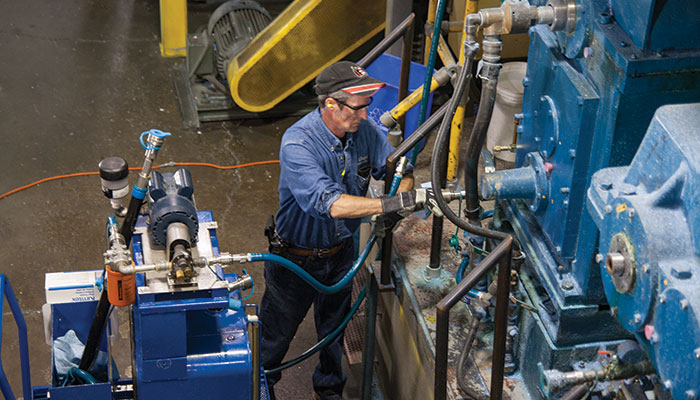How Clopay Plastics Sustains Lubrication Excellence
As a global leader in hygiene and healthcare products with plants in the United States, Germany and Brazil, Clopay Plastics remains a prime example of long-term championing of machinery lubrication excellence. One of the company’s U.S. facilities is located in Augusta, Kentucky. This small town of 1,700 people along the Ohio River is known mainly for being George Clooney’s hometown, or so it used to be. Each passing day, more people are coming to Clopay’s site to speak to its celebrity - Scotty Lippert.
While Lippert may have never set foot in a Hollywood studio, he has certainly earned recognition in industry. His plant has been classified as a benchmark for lubrication and has had visitors from Fortune 500 companies and eight countries come to hear about Clopay’s lubrication practices.

Lippert’s role as a lubrication systems leader played a large part in the Clopay site earning the International Council for Machinery Lubrication’s inaugural John R. Battle award for excellence in lubrication. Clopay Augusta is also the only plant to win both ICML awards, having received the Augustus H. Gill award for excellence in oil analysis. In addition, Lippert was named the Kentucky Manufacturing Employee of the Year in 2007 and had his name and accomplishments read in Washington, D.C., as part of the official congressional record. This marked quite a three-year rise for both Clopay and Lippert.
“Winning the awards was just the cherry on top of the cake, because the actual logic behind what we did was to improve reliability and keep people employed by producing a quality product on time, and that makes for future business,” Lippert says. “Lubrication is the cornerstone of any successful maintenance program. We have made great strides in reliability at our plant, but continuous improvement is always on our mind. When it comes to machine reliability, the competitive world demands it, as do our customers.”
In Lippert’s area, as in many corners of the world, there are a number of industries but a general lack of in-depth lubrication training.
“When some local industry contacted our nearby community college for classes in lubrication, the community college asked me to teach a course in lubrication,” Lippert recalls. “When I asked them how they got my name, I was told the local industry knew me as certified and having a benchmark lubrication system.”
Lippert credits a lot of his success to the support he has received from management.
“Clopay had performed lubrication for over a half century the same way,” he says. “After my training and ICML certification, changing the culture of lubrication practices was challenging. Without the support of management in our maintenance department, it would be practically impossible to do it. Fortunately, we’ve had nothing but support from our maintenance manager, who understood that if proper lubrication practices were performed, reliability of the machinery would greatly increase. We have most certainly seen that in our plant.”
Before training, automatic lubrication was unheard of in Lippert’s plant. Now the site has more than 50 automation units in service, not counting single-point lubers.
“It was common practice to change the oil in our critical gearboxes twice a year,” Lippert notes. “Since changing oil brands, adding proper filtration to the gearboxes, oil sampling and offline filtration, we are now going on 13 years without changing the oil by using oil analysis to determine oil condition. This has been a tremendous savings. Although I do not have a monetary value, it is in the thousands.”
Receiving ICML certification and the two ICML awards has changed Lippert’s career and how his organization is perceived, including by customers.
“Winning the awards was great,” Lippert says. “It shows others how hard we’ve worked to achieve better reliability. Especially on customer and ISO audits, they recognize a lot of work and improvement in our maintenance practices. We have several Fortune 500 companies as customers who come in and do audits. As of today, every company that has audited the Augusta plant has labeled our lubrication program as a benchmark and has come back to us for guidance in setting up a world-class lubrication program.”
Over the last eight years, Clopay Augusta has seen a 70-percent drop in bearing and water pump failures. Besides improving its lubrication program, the plant has also incorporated alignment and vibration analysis.
“What is more impressive to us is that we have been able to sustain the 70-percent drop in failure rates,” Lippert adds. “I have seen some companies not stay on top of maintenance programs and fall back into old habits.”
A few years ago, Lippert started receiving calls and emails from bearing vendors wanting to know why their bearing purchases had dropped dramatically.
“They thought I had switched vendors,” he says. “I’d say this is a true sign of lubrication excellence.”
To find out how your organization can win one of ICML’s recognition of excellence awards, visit www.lubecouncil.org. To submit a nomination, email your plant information to info@lubecouncil.org.
